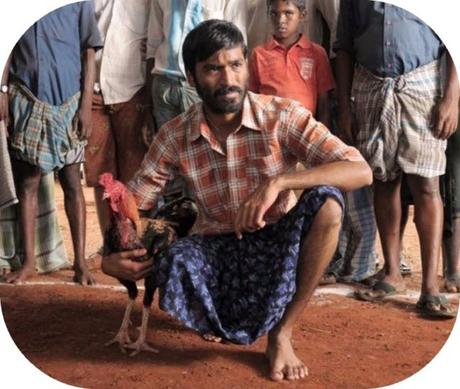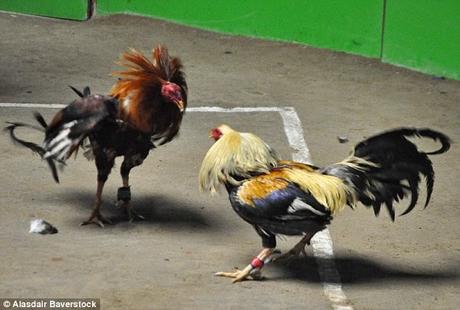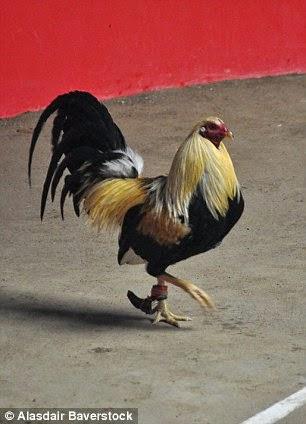 The
year dawned differently. Andhra
celebrated Sankranti with cock fights despite a court ban while Tamil Nadu fumed over the ban on Jallikattu. Politicians
of Andhra were united in organizing cockfights in Krishna and two regions of
Godavari. The government had allotted Rs
1 crore to each district and one minister to supervise it in their region. With
official patronage, Andhra police looked the other way and TDP, YSRC, BJP and
Congress leaders cheered the cocks and thousand of those betting and owners of
the bird and organizers exchanged crores of rupees.
Aadukalam
released in 2011, directed by
Vetrimaran, with Dhanush in lead role was hit.
The film won six awards at the 58th National Film Awards, including the awards for
Best Director, Best Screenplay and Best Actor. It was dubbed in Telegu as
‘Pandem kollu’. The film was set in the
backdrop of rooster fights in villages of Madurai. It was rooster fights and love in between
for the hero. The lines at the top are not indicative of the ‘rooster fights of
Maudrai or Vijayawada’ but of far off Mexico.
Mexican
cockfighting promoters on Friday kicked off an event billed as the largest
exhibition of the bloodsport the country has ever seen. The annual Texcoco
Horse Fair, which takes places on the eastern fringes of Mexico City, will see
16 nightly bouts of cockfighting over the space of a month – all of which end
in the death of one of the animals.
The
year dawned differently. Andhra
celebrated Sankranti with cock fights despite a court ban while Tamil Nadu fumed over the ban on Jallikattu. Politicians
of Andhra were united in organizing cockfights in Krishna and two regions of
Godavari. The government had allotted Rs
1 crore to each district and one minister to supervise it in their region. With
official patronage, Andhra police looked the other way and TDP, YSRC, BJP and
Congress leaders cheered the cocks and thousand of those betting and owners of
the bird and organizers exchanged crores of rupees.
Aadukalam
released in 2011, directed by
Vetrimaran, with Dhanush in lead role was hit.
The film won six awards at the 58th National Film Awards, including the awards for
Best Director, Best Screenplay and Best Actor. It was dubbed in Telegu as
‘Pandem kollu’. The film was set in the
backdrop of rooster fights in villages of Madurai. It was rooster fights and love in between
for the hero. The lines at the top are not indicative of the ‘rooster fights of
Maudrai or Vijayawada’ but of far off Mexico.
Mexican
cockfighting promoters on Friday kicked off an event billed as the largest
exhibition of the bloodsport the country has ever seen. The annual Texcoco
Horse Fair, which takes places on the eastern fringes of Mexico City, will see
16 nightly bouts of cockfighting over the space of a month – all of which end
in the death of one of the animals.
 Trainers from all
over the country compete not only for the title of best trainer, but also to
keep alive what they claim is a proud Mexican tradition despite demands to ban
the 'disgusting' sport. Injured birds are given only 15 seconds to recover,
even if they are incapable of fighting back; razorblades are attached to the
birds' left leg to make the fights 'more interesting' for gamblers and trainers. Trainers often spit on a rooster's head in a
common technique used to anger the bird before it fights. 'Cockfighting is deeply embedded in Mexico's
rural culture', Texcoco tourism spokeswoman Rosalinda Benitez told MailOnline
on the opening night of the month-long bloodsport bonanza. The event, which includes fairground
attractions and one of Mexico's biggest horse auctions, expects to receive more
than 600,000 visitors over the month.
'Banning these
events will never be accepted by the public', said Jaime Rodriguez, a Texcoco
resident who looks forward to the annual fair every year. While cockfighting is banned in all 50 US
states and Europe (it was banned in England in 1835), it nevertheless draws big
crowds in Mexico, where fans come to gamble on the fights and drink until the
early hours of the morning. Male birds are vicious and often emerge from the
scuffles with their beaks filled with other’s feathers. The birds are trained to attack with their
legs and feet first, and use the beak to finish the job later.
Starting on the
edge of the arena, the gamecocks are shown to one another, producing aggressive
crowing, before being placed in their respective corners and let loose to
attack one another. Often it is the
razor blades attached to legs and harm, mutilate and bleed the opponent bird. The
curved weapons attached to the birds’ legs are changed every five minutes in
order to ensure they are not left blunted by the sand of the arena.
Trainers from all
over the country compete not only for the title of best trainer, but also to
keep alive what they claim is a proud Mexican tradition despite demands to ban
the 'disgusting' sport. Injured birds are given only 15 seconds to recover,
even if they are incapable of fighting back; razorblades are attached to the
birds' left leg to make the fights 'more interesting' for gamblers and trainers. Trainers often spit on a rooster's head in a
common technique used to anger the bird before it fights. 'Cockfighting is deeply embedded in Mexico's
rural culture', Texcoco tourism spokeswoman Rosalinda Benitez told MailOnline
on the opening night of the month-long bloodsport bonanza. The event, which includes fairground
attractions and one of Mexico's biggest horse auctions, expects to receive more
than 600,000 visitors over the month.
'Banning these
events will never be accepted by the public', said Jaime Rodriguez, a Texcoco
resident who looks forward to the annual fair every year. While cockfighting is banned in all 50 US
states and Europe (it was banned in England in 1835), it nevertheless draws big
crowds in Mexico, where fans come to gamble on the fights and drink until the
early hours of the morning. Male birds are vicious and often emerge from the
scuffles with their beaks filled with other’s feathers. The birds are trained to attack with their
legs and feet first, and use the beak to finish the job later.
Starting on the
edge of the arena, the gamecocks are shown to one another, producing aggressive
crowing, before being placed in their respective corners and let loose to
attack one another. Often it is the
razor blades attached to legs and harm, mutilate and bleed the opponent bird. The
curved weapons attached to the birds’ legs are changed every five minutes in
order to ensure they are not left blunted by the sand of the arena.
 The cocks often scrap
furiously on the floor of the arena, which is covered in blood from previous
fights as men enjoy the cruelty. The cockfighting areana, known as a palenque,
in Texcoco has a capacity of more than 3,000 people, and few seats were left
unsold as the public clamoured to see the opening event of the month-long
celebration. Each cockfight runs for a maximum of 15 minutes, though most are
over within two. The so called sport revolves entirely around gambling, and
betting odds are always 2:1 on the fight's outcome. A fight is declared over only when one of
the birds is lying dead on the arena floor.
In December of last
year animal rights activists achieved a nationwide ban on the use of wild
animals in circuses, imposing fines of up to £180,000 on organisations which
cannot prove the domestic origins of any animals which are used in their
performances. The Mexican government is currently engaged in the struggle to
find homes for more than 2,000 repossessed tigers, lions, elephants and other
such animals which have been freed as a result of the law.
With regards – S.
Sampathkumar
The cocks often scrap
furiously on the floor of the arena, which is covered in blood from previous
fights as men enjoy the cruelty. The cockfighting areana, known as a palenque,
in Texcoco has a capacity of more than 3,000 people, and few seats were left
unsold as the public clamoured to see the opening event of the month-long
celebration. Each cockfight runs for a maximum of 15 minutes, though most are
over within two. The so called sport revolves entirely around gambling, and
betting odds are always 2:1 on the fight's outcome. A fight is declared over only when one of
the birds is lying dead on the arena floor.
In December of last
year animal rights activists achieved a nationwide ban on the use of wild
animals in circuses, imposing fines of up to £180,000 on organisations which
cannot prove the domestic origins of any animals which are used in their
performances. The Mexican government is currently engaged in the struggle to
find homes for more than 2,000 repossessed tigers, lions, elephants and other
such animals which have been freed as a result of the law.
With regards – S.
Sampathkumar
18th Mar 2015.

